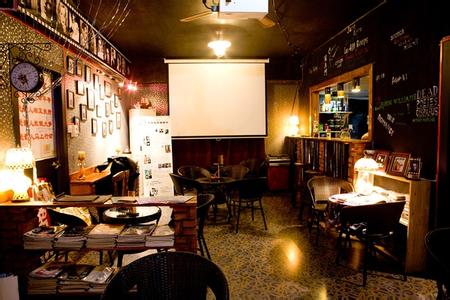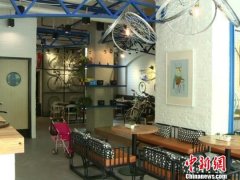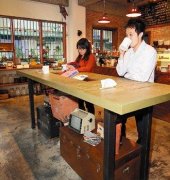Talking about the thinking brought by the "Cross-border" of Cafe
I believe that these "cross-border" of cafes are only the beginning of a full understanding of their commercial value. On the one hand, the cafe itself has a lot of exclusive marketing value, on the other hand, high-related cooperation can maximize the value of the brand.

I do not know when, cafes began to appear in the city like bamboo shoots after a spring rain. "when I resign, I will open a coffee shop." this has also become the naive idea of the petty bourgeoisie in many cities. Speaking of innocence, it is because it is easier to open a shop than to raise it. Not every cafe in the city lives so well. Moreover, with the rise of shop rents, the dream of opening a cafe seems to be getting farther and farther away from ordinary people.
Recently, however, the value of cafes has been rediscovered and has become a panacea for cross-border marketing.
Just give me a few examples. For example, cafes can be grafted with brick-and-mortar retailing. A few days ago, Uniqlo in the United States introduced Starbucks in the store in an attempt to give customers a better experience and keep them a little longer. Before that, Macy's, Target supermarket and Barnesand Noble Bookstore also introduced cafes early. For such enterprises, as long as they can retain customers for a while longer, they can increase their chances of shopping in the store.
Cafes and bookstores can be combined. Take the Fangsuo Bookstore in Taiguhui, Guangzhou as an example, it also integrates the mixed operation of bookstore, aesthetic life, coffee, exhibition space and clothing fashion, which can be said to provide a variety of services.
Cafes can also be combined with private shops. For example, there is a cafe called "ideal time", which not only provides coffee and exquisite decoration, but also sells almost all the furniture and decoration, such as dining chairs, tables, wall clocks and so on, which customers can take away as long as they like.
Cafes can be combined with luxury goods. Many luxury brands have coffee shops. For example, Gucci has two coffee shops in Florence, Italy, and Tokyo, Japan. The treasure of the town shop in Gucci Cafe in Tokyo Ginza is not coffee, but Gucci chocolate used to match it.
Cafes can even have access to high-end financial companies. Recently, China Merchants Bank United Coffee accompany you (Caffebene) launched the first coffee bank in China, that is, there is a special space in the cafe with a "visual counter" machine of China Merchants Bank, two self-service deposit and withdrawal machines, and a staff member of China Merchants Bank to provide services to customers at any time. Customers can not only enjoy the leisure, comfortable, petty bourgeois coffee shop environment, but also get the bank's professional financial services.
Why can cafes be grafted with so many other industries? The answer is actually very simple. The advantages of the cafe itself determine that it is simply a cross-border material by nature. First, the cafe itself has a very good image positioning. Cafes are imported and have been endowed with romantic colors a long time ago, which has a fatal attraction to young Chinese in the new era. Cafes located in medium-and high-yield consumer places are also very suitable for grafting brands consistent with the target customer base and become a natural marketing carrier. Second, as a drink, coffee can be needed at any time in 24 hours, not as cyclical as food. Therefore, cafes with good locations can basically have customers all the time, which in itself provides a good premise for marketing, and then increases the stickiness of customers and the rate of arrival. Third, there are few places for friends to sit and chat in China, and cafes are undoubtedly the most suitable place-elegant and inexpensive, as well as free WIFI. This can be seen from the consumption habits: Americans leave after buying coffee, while Chinese people like to sit up. The longer consumers stay in cafes, the more opportunities businesses can take advantage of marketing. Fourth, the rents of shops in popular locations are getting higher and higher, so it would be nice to find a like-minded partner to share the rent.
I believe that these "cross-border" of cafes are only the beginning of a full understanding of their commercial value. On the one hand, the cafe itself has a lot of exclusive marketing value, on the other hand, high-related cooperation can maximize the value of the brand. Cafes can develop more business models as long as they have the right partners and enough imagination.
Important Notice :
前街咖啡 FrontStreet Coffee has moved to new addredd:
FrontStreet Coffee Address: 315,Donghua East Road,GuangZhou
Tel:020 38364473
- Prev

Shanghai permanent Bicycle Cafe: a little nostalgic and environmentally friendly
A chandelier made of tires, a single bell made of bells, and decorations made of seats and handlebars hanging on the wall. The beige log-toned "permanent" store shows the "nostalgic + environmentally friendly" characteristics of this bicycle-themed cafe.
- Next

There are "half-price discount" cafes in Taiwan.
Cafes with half-price discounts for standing have emerged in Taiwan, attracting guests who are willing to drink coffee standing up.
Related
- What is the difference between Indonesian Sumatra Mantinin coffee and gold Mantinin? How to distinguish between real and fake golden Mantelin coffee?
- What does bypass mean in coffee? Why can hand-brewed coffee and water make it better?
- Unexpected! Ruixing Telunsu lattes use a smoothie machine to foam milk?!
- % Arabia's first store in Henan opens into the village?! Netizen: Thought it was P's
- Does an authentic standard mocha coffee recipe use chocolate sauce or powder? Mocha Latte/Dirty Coffee/Salty Mocha Coffee Recipe Share!
- What is the difference between Vietnam egg coffee and Norway egg coffee? Hand-brewed single product coffee filter paper filter cloth filter flat solution!
- What is the difference between sun-cured and honey-treated coffee? What are the differences in the flavor characteristics of sun-honey coffee?
- How to make Italian latte! How much milk does a standard latte use/what should the ratio of coffee to milk be?
- How to make butter American/butter latte/butter Dirty coffee? Is hand-brewed coffee good with butter?
- Is Dirty the cold version of Australian White? What is the difference between dirty coffee/decent coffee and Australian white espresso?

